Social-Political Issues
 |
 |
 |
 |
 |
 |
 |
Basics on the European Union – VIII
Europe’s Direction & Woes
From its beginnings as the “Coal and Steel community” to the landmark Treaty of Rome, the European Union has grown into one of the most important geo-political blocs on the face of the earth. Its rise is marked by the strategy of gradual expansion and cunning manipulation of politics.
Its leaders, convinced of their “humanitarian” ideals, are slowly but methodically implementing their plan for the formation of a European Super-State that would see the end of national sovereignty and the rise of a sort of “United States of Europe.”
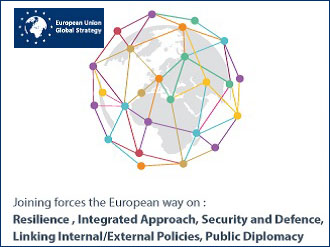 This is not a secret plan or cleverly concealed conspiracy; it is plainly stated goal of the EU itself.
This is not a secret plan or cleverly concealed conspiracy; it is plainly stated goal of the EU itself.
The declared objective of the EU leaders, encapsulated in their own words, is the construction of “an ever closer union.” This “European Dream,” they hope, will lead to a utopia of tolerance and post-modern liberal values. In such a world individual sovereignty becomes a threat, a bastion for potentially conservative or Christian counter attacks to their godless modernity.
As such the EU has engaged in the suppression of sovereignty for years. Only now has the sufficient backlash begun to undermine its foundation.
Germany Rules the Continent
When looking at the European Union, it must be remembered that,for all its idealism, there is a serious deficit in legitimacy. The EU, by and large, is a show run by a single player: Germany. There is no country in Europe that can hope to match Germany’s economic dominance and this reflects in the EU policy hinging on German cooperation.
Germany’s fiscal policy dictates the fate of the Euro; German aid decides the schemas of poorer neighbors. Even France, the 2nd strongest EU country (as England is leaving) is reliant on German approval for Macron’s Eurozone plans.
As such the EU has, practically speaking, accomplished what two world wars could not: German domination of Europe. Germany no longer even needs weapons to rule their neighbors. When it came out recently that at a NATO exercise German forces were so underfunded that they were using broomsticks instead of rifles, critics missed the point. Germany knows its money is better spent as financial clout.
Structural democratic deficit
Germany’s bloated position aside, the very concept of “democracy” in the EU is deceptive. The EU President is appointed, not elected. The actually elected Parliament cannot initiate legislation and in practice consents to almost everything proposed by the also unelected European Commission.
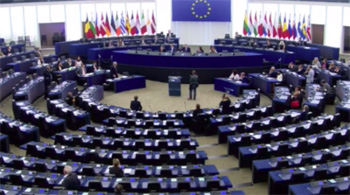 What elections are held to appoint Members of the European Parliament (MEPs) attract abysmally low voter numbers, meaning that those ostensibly orienting the direction of an entire continent are doing so based on the flimsy constituent mandates.
What elections are held to appoint Members of the European Parliament (MEPs) attract abysmally low voter numbers, meaning that those ostensibly orienting the direction of an entire continent are doing so based on the flimsy constituent mandates.
Even professionalism is lacking, as many of the Parliaments meetings suffer from massive absenteeism that sees speakers (except German ministers) making speeches to an empty chamber. It is a mockery of democracy that is abusing mass-appeal rhetoric to justify the existence of a political and bureaucratic machine. When the time is ripe for the machine to lurch forward, it simply engages the media-theatre to provide a public spectacle.
Distraction tactics
One of the primary strategies employed by the European political system is to circumscribe debate within the confines of what is seen as an acceptable outcome. The spectacle takes place, the pre-arranged outcome is confirmed, and the media is contented that the “democratic” process is satisfied, if they noticed at all.
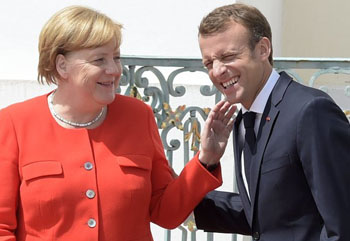 A timely example of this process was seen a few weeks ago. Merkel and Macron agreed, between the two of them, on the creation of a joint Euro-zone budget. This budget would effectively intrude into one of the last areas where member States retained a semblance of sovereignty: taxes.
A timely example of this process was seen a few weeks ago. Merkel and Macron agreed, between the two of them, on the creation of a joint Euro-zone budget. This budget would effectively intrude into one of the last areas where member States retained a semblance of sovereignty: taxes.
Despite the important implication this carries for national sovereignty, the event received only scant media attention. Those who did report on it played along with the theatrical narrative that saw the outcome as a “compromise.”
Macron the radical proposes lofty ideas for centralizing the EU. Merkel the sensible restrains him and tempers his lofty idealism with a “prudent” German compromise. Both parties are satisfied and the EU waxes in power, just not at the untenable pace first proposed by Macron. The desired outcome is achieved and all observers are left satisfied that there was “compromise.”
Did any other member States have a say? No. Was Merkel genuinely opposed to Macron’s plan for a stronger EU? Not at all.
What in actuality happened was an illusion of conflict. In reality the “moderate” option is what was first intended all along: the strengthening of the EU. The theatrics serve only as a display to distract from the fact that the terms of the discussion were all but decided beforehand. There was no question of whether the EU should be granted power; it was simply a question of how much.
New Socialism
With German money and a cast of dubiously legitimate Eurocrats, the EU has set about its business of installing what essentially amounts to a 21st century New Socialism.
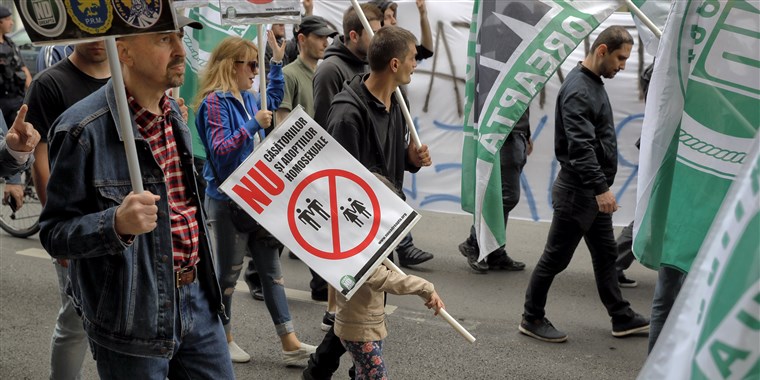 Detached from the lives of its people, the EU lures nations into dependency with economic incentives, only to start stripping them of their sovereignty after entry into its ranks. The final goal is to have a European State that is able to override any national sentiment. The final end aims to leave Europeans with no choice except to "enjoy" what the EU sees fit to dole out and endure what it sees fit to ordain. Its ordinations always lean towards the left.
Detached from the lives of its people, the EU lures nations into dependency with economic incentives, only to start stripping them of their sovereignty after entry into its ranks. The final goal is to have a European State that is able to override any national sentiment. The final end aims to leave Europeans with no choice except to "enjoy" what the EU sees fit to dole out and endure what it sees fit to ordain. Its ordinations always lean towards the left.
Whether it be the acceptance of immigrants or the forced recognition of homosexual “marriage,” as in the recent case in Romania, the once sovereign nations of Europe are rapidly diminishing to the status of mere provinces of a greater Socialist State.
A cause for hope
In spite of its vapid rhetoric and remorseless tactics, the EU is suffering tremors that are ultimately of its own construction. Europeans, increasingly disillusioned with the “European Dream,” are turning towards Euro-skeptic politicians who threaten the EU by affirming the legitimacy of their own national governments. Though few dare to blatantly oppose the EU, the resistance is becoming palpable.
Here are some signs of discontent:
Conclusion
Thus is modern Europe, the utopian socialist leviathan that coats itself with a veneer of democracy and placates the people with a debilitating comfort and the façade of free choice. All the while it guarantees itself the power to chip away at sovereignty and the few remaining fragments of Europe’s Christian traditions.
The future of the EU hinges on how it addresses the current crises. With a population plummeting into the void of the 21st century culture of death, mass immigration that is altering the demographics of Europe and establishing “no-go” areas, a Euro-zone teetering on the verge of collapse, and the rise of vociferous conservative parties across the continent, the rallying cry of the Europhiles remains pathetically unchanged: More Europe.
It is uncertain how long before their ideals will wreck against the icebergs of reality, or if their bankrupt fantasies will finish maturing into the Godless utopia for which they so eagerly crave.
All we can do now is wait. The outcome preferred by those in power is already apparent.
To be continued

Its leaders, convinced of their “humanitarian” ideals, are slowly but methodically implementing their plan for the formation of a European Super-State that would see the end of national sovereignty and the rise of a sort of “United States of Europe.”

An open aim to achieve a One World Order
The declared objective of the EU leaders, encapsulated in their own words, is the construction of “an ever closer union.” This “European Dream,” they hope, will lead to a utopia of tolerance and post-modern liberal values. In such a world individual sovereignty becomes a threat, a bastion for potentially conservative or Christian counter attacks to their godless modernity.
As such the EU has engaged in the suppression of sovereignty for years. Only now has the sufficient backlash begun to undermine its foundation.
Germany Rules the Continent
When looking at the European Union, it must be remembered that,for all its idealism, there is a serious deficit in legitimacy. The EU, by and large, is a show run by a single player: Germany. There is no country in Europe that can hope to match Germany’s economic dominance and this reflects in the EU policy hinging on German cooperation.
Germany’s fiscal policy dictates the fate of the Euro; German aid decides the schemas of poorer neighbors. Even France, the 2nd strongest EU country (as England is leaving) is reliant on German approval for Macron’s Eurozone plans.
As such the EU has, practically speaking, accomplished what two world wars could not: German domination of Europe. Germany no longer even needs weapons to rule their neighbors. When it came out recently that at a NATO exercise German forces were so underfunded that they were using broomsticks instead of rifles, critics missed the point. Germany knows its money is better spent as financial clout.
Structural democratic deficit
Germany’s bloated position aside, the very concept of “democracy” in the EU is deceptive. The EU President is appointed, not elected. The actually elected Parliament cannot initiate legislation and in practice consents to almost everything proposed by the also unelected European Commission.

Out of 751 members only 30 show up to hear the Maletese Prime Minister
Even professionalism is lacking, as many of the Parliaments meetings suffer from massive absenteeism that sees speakers (except German ministers) making speeches to an empty chamber. It is a mockery of democracy that is abusing mass-appeal rhetoric to justify the existence of a political and bureaucratic machine. When the time is ripe for the machine to lurch forward, it simply engages the media-theatre to provide a public spectacle.
Distraction tactics
One of the primary strategies employed by the European political system is to circumscribe debate within the confines of what is seen as an acceptable outcome. The spectacle takes place, the pre-arranged outcome is confirmed, and the media is contented that the “democratic” process is satisfied, if they noticed at all.

Despite pretended differences, the two are in perfect accord on growing a socialist EU
Despite the important implication this carries for national sovereignty, the event received only scant media attention. Those who did report on it played along with the theatrical narrative that saw the outcome as a “compromise.”
Macron the radical proposes lofty ideas for centralizing the EU. Merkel the sensible restrains him and tempers his lofty idealism with a “prudent” German compromise. Both parties are satisfied and the EU waxes in power, just not at the untenable pace first proposed by Macron. The desired outcome is achieved and all observers are left satisfied that there was “compromise.”
Did any other member States have a say? No. Was Merkel genuinely opposed to Macron’s plan for a stronger EU? Not at all.
What in actuality happened was an illusion of conflict. In reality the “moderate” option is what was first intended all along: the strengthening of the EU. The theatrics serve only as a display to distract from the fact that the terms of the discussion were all but decided beforehand. There was no question of whether the EU should be granted power; it was simply a question of how much.
New Socialism
With German money and a cast of dubiously legitimate Eurocrats, the EU has set about its business of installing what essentially amounts to a 21st century New Socialism.

Romanians take to the streets to protest a forced same-sex marriage law
Whether it be the acceptance of immigrants or the forced recognition of homosexual “marriage,” as in the recent case in Romania, the once sovereign nations of Europe are rapidly diminishing to the status of mere provinces of a greater Socialist State.
A cause for hope
In spite of its vapid rhetoric and remorseless tactics, the EU is suffering tremors that are ultimately of its own construction. Europeans, increasingly disillusioned with the “European Dream,” are turning towards Euro-skeptic politicians who threaten the EU by affirming the legitimacy of their own national governments. Though few dare to blatantly oppose the EU, the resistance is becoming palpable.
Here are some signs of discontent:
- Brexit continues despite a Soros-funded campaign for its reversal.
- Nordic countries are increasingly viewing the agenda of a centralized federal Europe with concern.
- Italy elected an anti-EU coalition as its resources are pushed to the breaking point by boat-loads of immigrants invading its lands.
- Hungary, the Czech Republic, Poland and Slovakia are all in united defiance of Brussels.
- Even in liberal Germany, the “extreme” right AFD has risen to a position of power. Merkel’s own allies are abandoning pro-immigrant positions in a mad scramble to woo back voters.
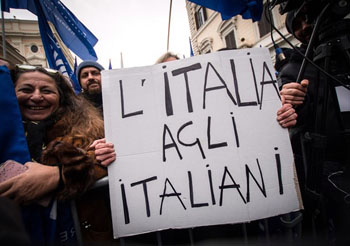
'Italy for Italians' – demonstrations protesting liberal immigration policies
Conclusion
Thus is modern Europe, the utopian socialist leviathan that coats itself with a veneer of democracy and placates the people with a debilitating comfort and the façade of free choice. All the while it guarantees itself the power to chip away at sovereignty and the few remaining fragments of Europe’s Christian traditions.
The future of the EU hinges on how it addresses the current crises. With a population plummeting into the void of the 21st century culture of death, mass immigration that is altering the demographics of Europe and establishing “no-go” areas, a Euro-zone teetering on the verge of collapse, and the rise of vociferous conservative parties across the continent, the rallying cry of the Europhiles remains pathetically unchanged: More Europe.
It is uncertain how long before their ideals will wreck against the icebergs of reality, or if their bankrupt fantasies will finish maturing into the Godless utopia for which they so eagerly crave.
All we can do now is wait. The outcome preferred by those in power is already apparent.
To be continued

Posted July 30, 2018
______________________
______________________
 Volume I |
 Volume II |
 Volume III |
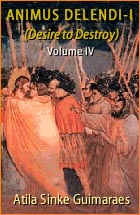 Volume IV |
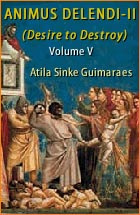 Volume V |
 Volume VI |
 Volume VII |
 Volume VIII |
 Volume IX |
 Volume X |
 Volume XI |
 Special Edition |


